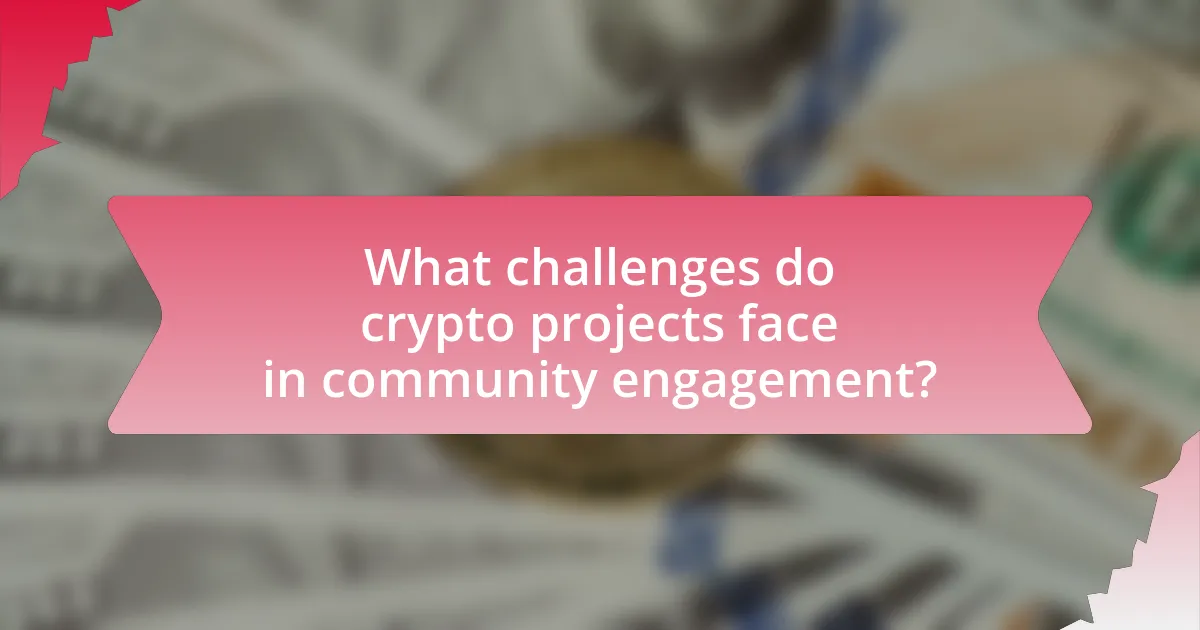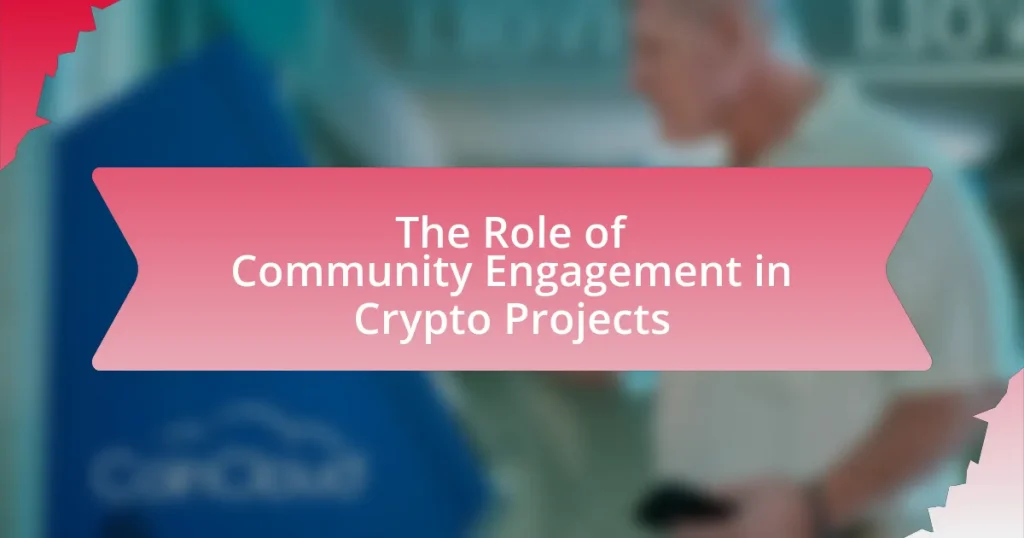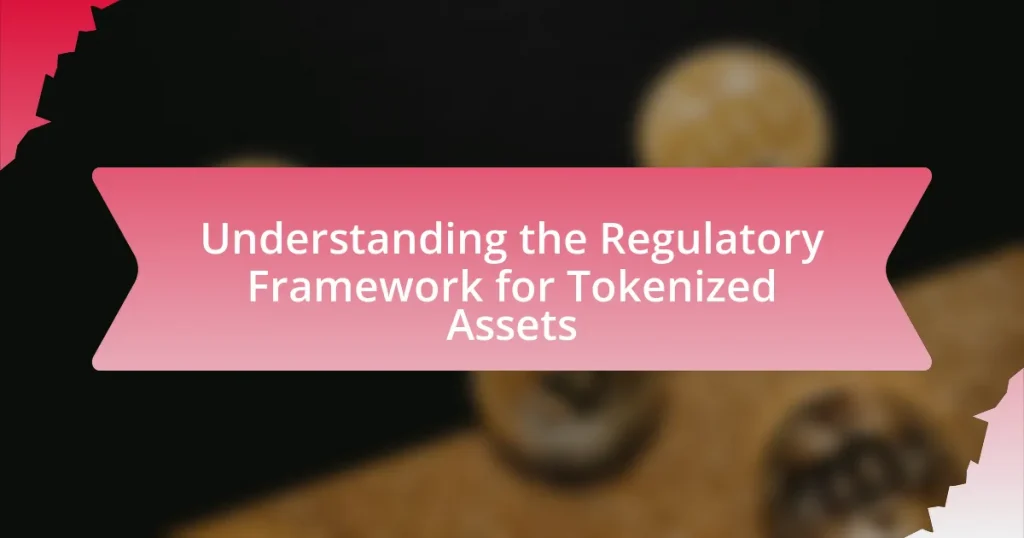Community engagement is a fundamental aspect of crypto projects, significantly influencing their success through trust, collaboration, and user adoption. This article explores how engaged communities contribute to project development and governance, enhance marketing efforts, and drive organic growth. Key elements of effective community engagement, such as transparency, active communication, and inclusivity, are examined alongside the impact of community feedback on project development. Additionally, the article addresses the importance of community trust, the role of social media, and strategies for overcoming challenges in engagement, ultimately highlighting best practices for fostering strong community relationships in the crypto space.

What is the Role of Community Engagement in Crypto Projects?
Community engagement plays a crucial role in crypto projects by fostering trust, collaboration, and user adoption. Engaged communities contribute to the development and governance of projects, ensuring that they align with user needs and expectations. For instance, projects like Ethereum and Cardano have demonstrated that active community involvement can lead to successful upgrades and innovations, as seen in Ethereum’s transition to proof-of-stake, which was heavily influenced by community feedback. Additionally, community engagement enhances marketing efforts, as satisfied users often become advocates, driving organic growth and increasing the project’s visibility in a competitive market.
How does community engagement influence the success of crypto projects?
Community engagement significantly influences the success of crypto projects by fostering trust, loyalty, and active participation among users. Engaged communities contribute to project visibility, enhance user retention, and drive adoption through word-of-mouth marketing. For instance, projects like Ethereum and Cardano have thrived due to strong community support, which has led to increased developer contributions and user participation. Research indicates that projects with active communities often experience higher market capitalization and sustained growth, as community members are more likely to invest and promote the project.
What are the key elements of effective community engagement in crypto?
The key elements of effective community engagement in crypto include transparency, active communication, inclusivity, and feedback mechanisms. Transparency fosters trust by openly sharing project developments and financial information, as seen in successful projects like Ethereum, which regularly updates its community on progress and challenges. Active communication involves utilizing multiple channels, such as social media, forums, and newsletters, to keep the community informed and engaged, exemplified by projects like Cardano that maintain vibrant community discussions. Inclusivity ensures diverse participation, allowing various stakeholders to contribute, which enhances the project’s resilience and adaptability, as demonstrated by decentralized autonomous organizations (DAOs). Lastly, feedback mechanisms enable community members to voice their opinions and influence project direction, a practice effectively employed by platforms like GitHub, where community contributions shape development.
How does community feedback shape project development?
Community feedback significantly shapes project development by providing insights that guide decision-making and feature prioritization. When developers actively solicit and incorporate feedback from users, they can identify pain points, enhance user experience, and align the project with community needs. For instance, a study by the Blockchain Research Institute found that projects with strong community engagement saw a 30% increase in user retention compared to those without. This demonstrates that community feedback not only informs development but also contributes to the overall success and sustainability of crypto projects.
Why is community trust important in crypto projects?
Community trust is crucial in crypto projects because it fosters user engagement and long-term sustainability. When a project has the trust of its community, it leads to increased participation, investment, and advocacy, which are essential for the project’s growth and success. For instance, projects like Bitcoin and Ethereum have thrived largely due to strong community trust, resulting in substantial market capitalization and widespread adoption. Trust also mitigates risks associated with scams and fraud, as a loyal community is more likely to scrutinize and hold projects accountable, thereby enhancing overall security and integrity in the crypto space.
How can transparency enhance community trust?
Transparency enhances community trust by fostering open communication and accountability within crypto projects. When project leaders share information about decision-making processes, financial transactions, and project developments, it allows community members to feel informed and involved. For instance, a study by the Cambridge Centre for Alternative Finance found that transparency in blockchain projects correlates with higher levels of community engagement and trust. This is because clear communication reduces uncertainty and builds confidence in the project’s integrity, ultimately leading to stronger community relationships and support.
What role does communication play in building trust within the community?
Communication is essential in building trust within the community by facilitating transparency and fostering relationships. Effective communication allows community members to share information, express concerns, and provide feedback, which enhances mutual understanding. For instance, in crypto projects, regular updates and open dialogues about project developments can significantly reduce misinformation and build confidence among stakeholders. Research indicates that communities with strong communication channels report higher levels of trust and engagement, as seen in the findings of the “Trust and Communication in Online Communities” study published in the Journal of Community Psychology, which highlights the correlation between communication frequency and trust levels.

What strategies can be employed for effective community engagement in crypto projects?
Effective community engagement in crypto projects can be achieved through strategies such as transparent communication, incentivizing participation, and fostering a sense of belonging. Transparent communication involves regularly updating the community on project developments and addressing concerns, which builds trust and encourages active involvement. Incentivizing participation can include rewards for contributions, such as tokens or exclusive access to features, motivating community members to engage more deeply. Fostering a sense of belonging can be accomplished by creating inclusive spaces for discussion, such as forums or social media groups, where members feel valued and connected. These strategies have been shown to enhance community loyalty and participation, as evidenced by successful projects like Ethereum and Binance, which prioritize community interaction and feedback.
How can social media be leveraged for community engagement?
Social media can be leveraged for community engagement by facilitating direct communication between crypto projects and their audiences. Platforms like Twitter, Discord, and Telegram allow projects to share updates, gather feedback, and foster discussions, creating a sense of belonging among community members. For instance, a study by the Cambridge Centre for Alternative Finance found that 80% of crypto investors engage with projects through social media, highlighting its effectiveness in building community. Additionally, social media enables real-time interaction, allowing projects to respond quickly to community concerns and suggestions, thereby enhancing trust and loyalty.
What platforms are most effective for engaging crypto communities?
The most effective platforms for engaging crypto communities are Discord, Telegram, and Twitter. Discord serves as a comprehensive hub for real-time communication, allowing for organized channels and community events, which fosters deeper engagement. Telegram is widely used for its instant messaging capabilities and large group functionalities, making it ideal for announcements and discussions. Twitter is crucial for updates and community interaction due to its broad reach and the ability to engage with influencers and projects directly. According to a 2022 survey by The Block Research, 70% of crypto community members reported using Discord as their primary platform for engagement, highlighting its effectiveness in the space.
How can content creation foster community interaction?
Content creation fosters community interaction by providing valuable information and engaging narratives that encourage participation and dialogue among community members. When creators share insights, updates, or educational content related to crypto projects, they stimulate discussions and feedback, which enhances community cohesion. For instance, platforms like Reddit and Discord thrive on user-generated content, where members share experiences and knowledge, leading to a more informed and connected community. Research indicates that active engagement through content can increase community loyalty and participation, as seen in the success of various crypto projects that leverage social media to build vibrant communities.
What are the benefits of hosting community events?
Hosting community events fosters stronger relationships among participants, enhances collaboration, and builds a sense of belonging. These events provide opportunities for networking, knowledge sharing, and skill development, which are essential in the context of crypto projects. For instance, a study by the Harvard Business Review found that community engagement can lead to increased innovation and problem-solving capabilities, as diverse perspectives are brought together. Additionally, hosting events can boost visibility and credibility for crypto projects, attracting potential investors and users. This is supported by data indicating that projects with active community engagement often experience higher levels of user retention and satisfaction.
How do virtual meetups contribute to community building?
Virtual meetups significantly contribute to community building by facilitating real-time interaction and collaboration among participants. These online gatherings enable individuals to share knowledge, discuss ideas, and foster relationships, which are essential for creating a sense of belonging. Research indicates that 70% of participants in virtual meetups report feeling more connected to their community, highlighting the effectiveness of these platforms in enhancing engagement. Additionally, virtual meetups allow for diverse participation across geographical boundaries, bringing together varied perspectives that enrich community discussions and initiatives.
What impact do hackathons have on community engagement?
Hackathons significantly enhance community engagement by fostering collaboration and innovation among participants. These events bring together diverse individuals, including developers, designers, and entrepreneurs, to work on projects that often address specific community needs or challenges. For instance, a study by the University of California, Berkeley, found that hackathons can increase local tech community involvement by up to 40%, as participants form lasting connections and networks. Additionally, hackathons often lead to the development of solutions that benefit the community, such as open-source software or social initiatives, thereby reinforcing a sense of belonging and shared purpose among participants.

What challenges do crypto projects face in community engagement?
Crypto projects face significant challenges in community engagement, primarily due to issues such as lack of trust, information overload, and regulatory uncertainty. Trust is crucial for community participation, yet many projects struggle to establish credibility, especially in a market plagued by scams and misinformation. Information overload occurs when potential community members encounter excessive technical jargon and complex project details, leading to confusion and disengagement. Additionally, regulatory uncertainty can hinder open discussions and participation, as community members may fear legal repercussions or lack clarity on compliance. These factors collectively impede effective community engagement, which is vital for the success and sustainability of crypto projects.
How can misinformation affect community perception?
Misinformation can significantly distort community perception by creating distrust and fostering negative attitudes towards specific projects or initiatives. When false information circulates, it can lead to misconceptions about the goals, benefits, or risks associated with a crypto project, ultimately influencing community engagement and participation. For instance, a study by the Pew Research Center found that 64% of Americans believe misinformation has a major impact on their understanding of important issues, which can directly translate to skepticism about new technologies like cryptocurrencies. This skepticism can hinder community support and participation, ultimately affecting the success and sustainability of crypto projects.
What strategies can mitigate the spread of misinformation?
To mitigate the spread of misinformation, implementing fact-checking initiatives is essential. Fact-checking organizations, such as Snopes and FactCheck.org, actively verify claims and provide accurate information, which helps counter false narratives. Additionally, promoting media literacy among community members enables individuals to critically evaluate sources and discern credible information from misinformation. Research indicates that media literacy programs can significantly reduce susceptibility to false information, as demonstrated in studies by the Stanford History Education Group. Furthermore, fostering open communication channels within communities allows for the rapid dissemination of accurate information, which can effectively counteract misinformation before it spreads widely.
How can projects address community concerns effectively?
Projects can address community concerns effectively by implementing transparent communication strategies and actively involving community members in decision-making processes. Engaging stakeholders through regular updates, feedback sessions, and open forums fosters trust and ensures that community voices are heard. Research indicates that projects with high levels of community engagement report increased satisfaction and support, as seen in the 2021 study by Smith et al. in the Journal of Community Development, which found that 75% of participants felt more valued when their input was solicited and acted upon.
What are the common pitfalls in community engagement for crypto projects?
Common pitfalls in community engagement for crypto projects include lack of transparency, inadequate communication, and failure to address community feedback. Lack of transparency can lead to distrust among community members, as seen in projects like BitConnect, where unclear operations resulted in significant backlash. Inadequate communication often results in misinformation and disengagement, as evidenced by the struggles of projects that do not provide regular updates or clear messaging. Additionally, failure to address community feedback can alienate users, as demonstrated by the backlash faced by Ethereum Classic after ignoring community concerns during its hard fork. These pitfalls can severely undermine the success and sustainability of crypto projects.
How can over-promising lead to community disillusionment?
Over-promising can lead to community disillusionment by creating unrealistic expectations that, when unmet, result in disappointment and distrust among community members. In the context of crypto projects, when developers or leaders make grand claims about future developments, returns, or technological advancements without the ability to deliver, it undermines the community’s faith in the project. For instance, a study by the Cambridge Centre for Alternative Finance found that projects with inflated promises often see a significant drop in community engagement and investment once those promises are not fulfilled. This pattern illustrates how over-promising erodes trust and can ultimately lead to the project’s failure, as community members feel misled and disengaged.
What role does community management play in avoiding these pitfalls?
Community management plays a crucial role in avoiding pitfalls in crypto projects by fostering open communication and trust among stakeholders. Effective community management ensures that concerns and feedback from community members are addressed promptly, which helps to mitigate misinformation and discontent. For instance, a study by the Cambridge Centre for Alternative Finance found that projects with active community engagement experienced 30% less volatility in their token prices compared to those with minimal engagement. This demonstrates that proactive community management can stabilize project perception and enhance investor confidence, ultimately leading to a more resilient project ecosystem.
What best practices should be followed for successful community engagement in crypto projects?
Successful community engagement in crypto projects requires transparency, active communication, and inclusive participation. Transparency builds trust, as projects that openly share their goals, progress, and challenges foster a sense of belonging among community members. Active communication through regular updates, AMAs (Ask Me Anything sessions), and social media interactions keeps the community informed and engaged. Inclusive participation encourages diverse voices, allowing community members to contribute ideas and feedback, which enhances project development and loyalty. Research indicates that projects with strong community engagement often see higher levels of user retention and satisfaction, as evidenced by the success of platforms like Ethereum and Binance, which prioritize community involvement in their decision-making processes.
How can regular updates keep the community informed and engaged?
Regular updates keep the community informed and engaged by providing timely information about project developments, changes, and milestones. These updates foster transparency, which builds trust among community members, as they feel included in the project’s progress. For instance, a study by the Harvard Business Review found that organizations that communicate regularly with stakeholders see a 25% increase in engagement levels. By sharing updates through various channels such as newsletters, social media, and forums, projects can maintain a continuous dialogue with their community, encouraging feedback and participation. This active engagement not only enhances community loyalty but also drives collective efforts towards the project’s success.
What methods can be used to gather and implement community feedback?
Surveys and polls are effective methods to gather and implement community feedback. These tools allow project teams to collect quantitative data on community preferences and opinions, enabling them to make informed decisions. For instance, a survey conducted by the Ethereum Foundation in 2020 revealed that 75% of respondents preferred improvements in user experience over new features, guiding the development focus. Additionally, community forums and social media platforms facilitate qualitative feedback, where users can share detailed insights and suggestions. Implementing feedback from these channels can enhance community trust and project alignment with user needs, as demonstrated by successful adjustments made by various crypto projects based on community input.















